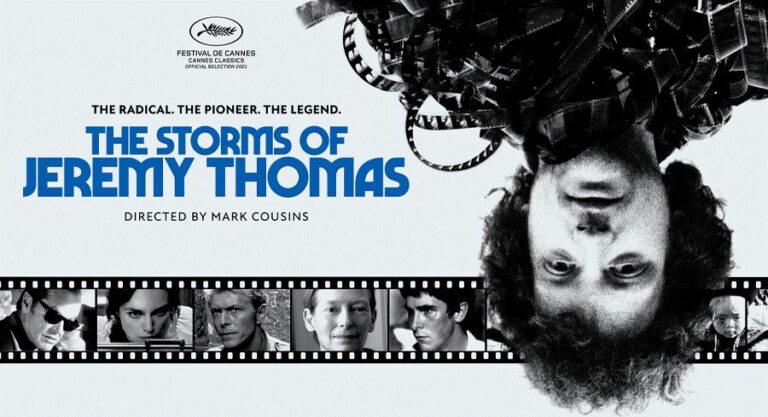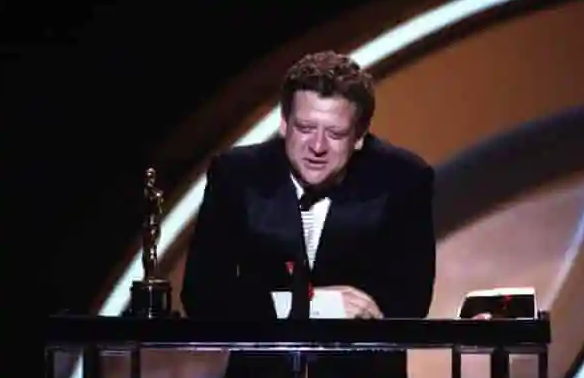
The English-born and Northern Irish director and writer, after his exceptional cinematic works — such as the 2011 film The Story of Film: An Odyssey that was broadcast as 15 one-hour television episodes — returns with a new motion picture. Mark Cousins embarks upon a journey (literally and metaphorically) with one of the most prominent producers of our time: Jeremy Thomas.
We are introduced to this pillar of independent cinema as a fairytale character. Mark Cousins begins The Storms of Jeremy Thomas with the words “Once upon a time there was a movie prince, born into a British Hollywood.” The English producer, indeed, came from a filmmaking family with his father, Ralph Philip Thomas, and uncle, Gerald, both being directors. But he managed to pave his own path, producing films such as Bernardo Bertolucci’s The Last Emperor (that won him an Academy Award for Best Picture), Little Buddha, The Sheltering Sky and The Dreamers. Thomas’ extensive output of over forty films includes three films directed by Nicolas Roeg: Bad Timing, Eureka and Insignificance. Mark Cousins has always been close to this kind of cinematic storytelling, since he presented the BBC cult film series Moviedrome from 1997 to 2000 and introduced 66 films for the show, including Nicolas Roeg’s Eureka.

As The Storms of Jeremy Thomas progresses the protagonist expresses how he felt a strong fascination for Nipponic cinema, which led him to work with Nagisa Oshima on Gohatto and Merry Christmas, Mr. Lawrence (that starred David Bowie); and Takashi Miike’s 13 Assassins and Hara-Kiri: Death of a Samurai. His works also include The Hit directed by Stephen Frears and various of Matteo Garrone’s films such as Tale of Tales, Dogman and Pinocchio. The British producer has also embarked upon ambitious projects such as Bhutanese Dzongkha-language film written and directed by Khyentse Norbu, Travellers and Magicians, and the Polish drama EO, directed by Jerzy Skolimowski and nominated the Academy Award for Best International Feature Film at the 95th Academy Awards.
The Storms of Jeremy Thomas, is a compelling road trip between interviewer (director Mark Cousins) and interviewee (Jeremy Thomas). This is not the first time that Cousins adopts the road-trip format with the protagonist of his documentary, since in 2005 he shot On The Road With Kiarostami. For this occasion, the narrative trigger is an old tradition of Jeremy Thomas: driving from England to the Cannes Film Festival. The five-days they spend together on the road allows time to stop — although the car keeps going — and to retrace the exceptional and daring filmography of Jeremy Thomas.

The journey is intertwined with acclaimed actors who give exclusive insights into the producer and his vision, like Debra Winger and Tilda Swinton. The latter analyses in depth Jeremy Thomas’ ‘Englishness’, based on how he positions himself amongst outsider artists and cherishes transgression. The British producer’s width of view and robust moral sensibility is defined by Tilda Swinton as “a duty to look at sin and unpack it, as well as own it in a generous and romantic way.” In fact, Thomas has always embraced a certain radicalism in the choice of his projects, as attested by David Cronenberg’s Crash that was a film that caused much scandal. His passion for cars emerges also in his films. But above all the common thread of his filmography is how bodies are electric voltage, they often become weapons, as sex and politics acquire allegorical meanings.
What emerges throughout the film is the way Thomas is besotted with movie stars, such as Marlon Brando, Jack Nicholson and Greta Garbo. His extensive knowledge of cinema is conveyed in his work at all times. The English gentleman of motion pictures has dedicated his entire life to cinema, to the extent that he sees it filtered by this artistic medium: “I often think about life based on scenes I’ve seen in movies,” he says. But he himself has been of utmost influence to cinema. It doesn’t surprise that BAFTA-winning film producer Rebecca O’Brien — known especially for her work with Ken Loach — defines Jeremy Thomas as ‘the producer of producers.’
The documentary’s interviewees explain that if there were to be Jeremy Thomas’ super-human manifestation of cinema, the storm would be his element. Mark Cousins compares Jeremy Thomas to the Romantic painter J. M. W. Turner, as well as writer Virginia Woolf, the director of The Red Shoes Michael Powell, artist Francis Bacon and punk impresario Malcom McLaren. All these enlightened creatives from the United Kingdom share with Jeremy Thomas the pursuit of social change. Jeremy Thomas takes this mission upon his shoulders through the realm of motion pictures, that has always been his reason for being. “I love cinema too much,” he says and adds that he sees it as “a virus that infected me and I hope to have passed on.” Needless to say his filmic contagion has fruitfully contaminated cinephiles all over the globe, and thanks to Mark Cousins’ The Storms of Jeremy Thomas it will keep spreading.
Final Grade: B+

